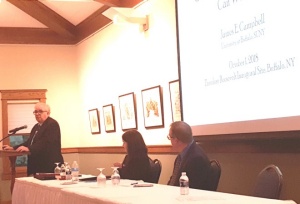Department News

Agree to Disagree: A new study makes the case for being a sore loser
by Ephrat Livni
Quartz, May 28, 2018
Professor James Campbell speaking on a panel, October 1st, 2018 at the Theodore Roosevelt Inaugural Site, Buffalo.
You don't make it to the Supreme Court by taking the short view.
If you’re going to disagree with people, you might as well make a stink. Anything less, and you’re destined to be forgettable.
That’s one lesson from a recent study entitled “How to lose cases and influence people,” published in the journal Statistics, Politics, and Policy, which examines the effectiveness of dissenting opinions in the US Supreme Court. It concludes that legal losers can be influential—especially sore losers.
Political scientists Rachael K Hinkle of the State University of New York, Buffalo and Michael Nelson of Pennsylvania State University set out to understand why justices bother to disagree with their colleagues by writing minority opinions, despite the effort involved and the social cost of openly sparring with their coworkers. In analyzing the language of dissenting opinions, they found that emotional and vivid losing arguments get cited in later cases, while polite, mild disagreements don’t.
Source: Read more.
